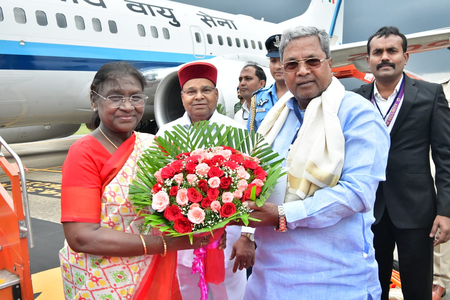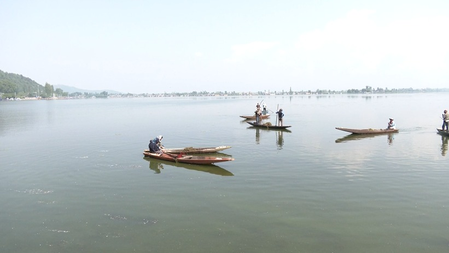Demolition Drive Clears Eight Illegal Colonies in Gurugram’s Sohna




Mysuru, Sep 1 (IANS) Karnataka Chief Minister Siddaramaiah extended a warm welcome to President Droupadi Murmu, who arrived at the Mysuru Airport on Monday, to attend various events during her two-day tour of Karnataka.
Siddaramaiah greeted the President with a bouquet, while Governor Thaawarchand Gehlot was also present on the occasion.
During her visit, President Murmu will take part in the Diamond Jubilee celebrations of the All India Institute of Speech and Hearing (AIISH) in Mysuru.
On Tuesday, she will attend a breakfast meeting with the Mysuru royal family.
Later, after visiting the historic Mysuru Palace, she is scheduled to leave for Chennai.
After the inauguration of AIISH’s “Diamond Jubilee Celebrations” by President Murmu in Mysuru, Chief Minister Siddaramaiah, in his address, said, “Detecting a child’s speech and hearing problems while still in the mother’s womb is indeed a major achievement. For this, the Mysuru-based All India Institute of Speech and Hearing (AIISH) deserves appreciation.”
Further progress and achievements are needed in this field, he said, adding that the state government has already allotted 10 acres of land for the institute and is ready to provide all necessary support.
The Chief Minister said that AIISH is one of Asia’s premier institutions working in the field of speech and hearing disorders, and it is a matter of pride for Mysuru district and the state.
“This institute has given voice to the voiceless and filled speech into the lives of those who cannot hear. Having such an institute in Mysuru and celebrating its Diamond Jubilee is indeed a matter of pride for all of us,” Siddaramaiah added.
He emphasised that while all human organs are important, eyes and ears are the most crucial.
Vision and auditory perception shape and control human speech, the Chief Minister said.
According to the 2011 National Census, Karnataka has about 3.3 lakh people, who are speech and hearing impaired, amounting to 0.5 per cent of the population.
“These individuals are not just statistics but living examples of constant struggle. It is the responsibility of society and the government to protect and support them with utmost care,” Siddaramaiah said.
The Chief Minister recalled that AIISH, established in Mysuru in 1966, has been serving as a premier national institute in human resource development, research, treatment, rehabilitation, and education related to speech and hearing problems.
The institute has earned national and international recognition, with the World Health Organisation identifying it as a “Centre of Excellence” and the Union Department of Science and Technology recognising it as a “Science and Technology Institute”, he noted with appreciation.
He also said that the state government’s Department of Health and Family Welfare has provided space in district and taluk hospitals, as well as community health centres, for AIISH’s outreach service centres and newborn screening units.
Highlighting the state’s initiative, Siddaramaiah added that under the government-sponsored cochlear implant programme “Shravana Sanjeevini”, Rs 32 crore has been earmarked in the 2024-25 budget to provide costly cochlear implant surgeries free of cost to children from economically weaker sections.
To further expand AIISH’s clinical and rehabilitation services, the state government has allotted 10 acres of land at Varuna village in Mysore district free of cost.
He added that the Mysuru City Corporation has taken up works worth Rs 2.55 crore within the institute premises, including the construction of an amphitheatre for differently-abled children, differently-abled-friendly facilities, development of a park, waiting room and museum for speech and hearing-impaired children.
“It is only because of such premier institutes that we have been able to develop the technology to detect communication disorders even during the fetal stage. The institute has also been carrying out the vital task of creating awareness in society about identifying and treating such problems,” he said.
On the occasion of the Diamond Jubilee, the Chief Minister expressed gratitude to all the experts, professors, staff, and students, who have worked and are working at AIISH for the upliftment of a healthier society.
“With its 60 years of glorious history, I hope this institute will grow to even greater heights, undertake all necessary research to prevent speech and hearing impairments permanently, and bring light to the world,” Siddaramaiah said.
Governor Thaawarchand Gehlot, Union Minister of State for Health and Family Welfare Anupriya Patel, Karnataka’s Health Minister Dinesh Gundu Rao, and Mysuru MP Yaduveer Krishnadatta Chamaraja Wadiyar were present on the occasion.
–IANS
mka/khz


New Delhi, Dec 31 (IANS) At least 138.34 crore Aadhaar numbers have been generated so far, while 67 million Ayushman Bharat Health Account (ABHA) numbers have also been created, the Ministry of Electronics and IT said in its year-end review on Tuesday.
India’s Digital Public Infrastructure (DPI) drives accessible and secure public services, transforming the digital economy.
Key achievements include 138.34 crore Aadhaar numbers being generated.
The Unified Payments Interface (UPI) achieved 15,547 crore transactions worth Rs 223 lakh crore from January to November this year, ‘showcasing its transformative impact on financial transactions’ in India.
In line with the government’s vision of paperless governance, Digi Locker has become a revolutionary platform for the issuance and verification of documents.
“With over 37 crore registered users, Digi Locker has transformed the way citizens access and authenticate their documents,” said the ministry.
Unified Mobile Application for New-Age Governance (UMANG) is another key initiative aimed at simplifying access to government services.
With over 7.12 crore users, UMANG has streamlined the way citizens engage with government services.
UMANG is available in 23 multilingual languages (for top 100 services), including English and Hindi. As of now, UMANG offers about 2,077 services from 207 departments of the Central and state governments, the ministry informed.
India’s digital infrastructure has undergone a transformative evolution in recent years, positioning the country as a global leader in digital adoption.
With a rapidly expanding digital economy, driven by innovations in Cloud Computing, Artificial Intelligence (AI), Machine Learning (ML), and digital governance, India’s infrastructure is continuously evolving to meet the growing demands of the public and private sectors.
According to the ministry, the National Informatics Centre (NIC) has established state-of-the-art National Data Centres (NDC) in cities like Delhi, Pune, Bhubaneswar, and Hyderabad, providing robust cloud services to government ministries, state governments, and public sector undertakings (PSUs).
At NDC, storage capacity has been expanded to approximately 100PB, including All Flash Enterprise Class Storage, Object Storage, and Unified Storage.
Additionally, around 5,000-odd servers are deployed to support various cloud workloads.
Another state-of-the-art NDC (Tier-III) of 200 Racks expandable to 400 Racks is being established at Guwahati, Assam.
Digital Infrastructure for Knowledge Sharing (DIKSHA), is the world’s largest education platform. As on July 22, 2024, 556.37 crore learning sessions have been imparted using DIKSHA. It has achieved 17.95 crore course enrolments and 14.37 crore course completions.
The CSCs initiative, managed by the MeitY, has played a vital role in bringing e-services to rural India.
As of October 2024, over 5.84 lakh CSCs are operational across the country, including 4.63 lakh at the Gram Panchayat level, the initiative has facilitated the delivery of more than 800 services ranging from government schemes to education, telemedicine, and financial services.
–IANS
na/rad


New Delhi, May 12 (IANS) The Indian Army on Monday said that Jammu and Kashmir and other areas along the International Border remained largely peaceful during the night.
A statement from the Army mentioned that “no incident has been reported, marking the first calm night in recent days”.
The peaceful night comes days after Pakistan indulged in unprovoked firing and later heavy shelling on the Line of Control and International Border in Jammu and Kashmir. The night also had no sounds of drones, missiles, or jets flying around.
For the first time in several days, locals in the Jammu region, including the heavily affected areas of Poonch and Rajouri, had peace.
The situation seems to be getting normal in the main Jammu city as no drones, firing or shelling was reported during the night.
In Kashmir, also, the fear of drones and jets flying has subsided. In the morning, people were seen moving in the Srinagar markets as usual.
The calm has provided the much-needed relief to the people, allowing them to return to their normal routines.
“The night remained largely peaceful in Jammu and Kashmir and other areas along the International Border. No incident has been reported, marking the first calm night in recent days,” said the Indian Army.
The peace came after Pakistan urged for a ceasefire following the Indian Armed Forces’ pounding of its airbases. India has said that 11 airbases of Pakistan have been destroyed in the missile attacks by the Indian Armed Forces.
On May 7, India launched airstrikes on nine terror bases in Pakistan, demolishing buildings and killing over 100 terrorists to avenge the April 22 Pahalgam terror attack. Rattled Pakistan tried to carry out drone raids and conducted heavy shelling on the LoC and the International Border, targeting Jammu in particular.
Pakistan also carried out drone raids along the western border. It was in retaliation for this that the Indian Armed Forces struck hard and destroyed its airbases, thereby causing huge losses to Pakistan.
India and Pakistan arrived at an understanding for a ceasefire on Saturday along the LoC and the International Border.
Foreign Secretary Vikram Misri stated that the Directors General of Military Operations (DGMOs) from both countries agreed to halt all forms of military action — on land, in the air, and at sea — effective from 5 p.m. on Saturday. Since then situation on the LoC and International Border has been largely peaceful, however, Pakistani forces have tried to breach the understanding. India has categorically said that any breach will be considered an act of war, which will be dealt with severely.
–IANS
dpb/
